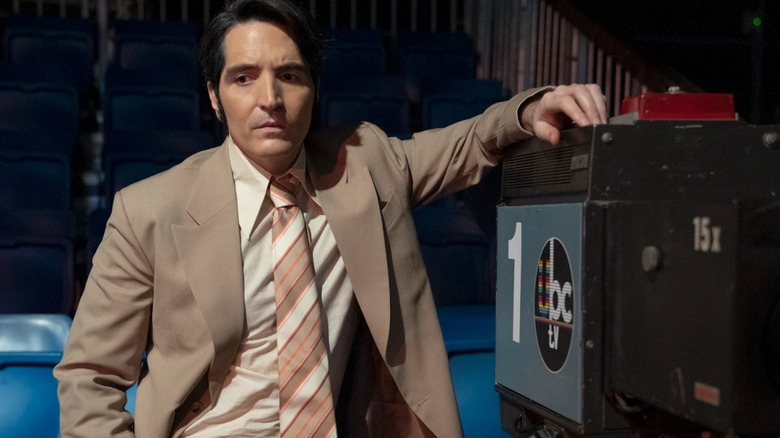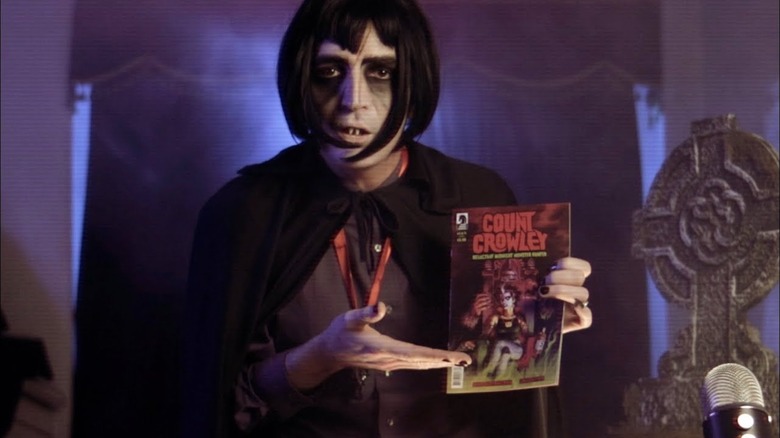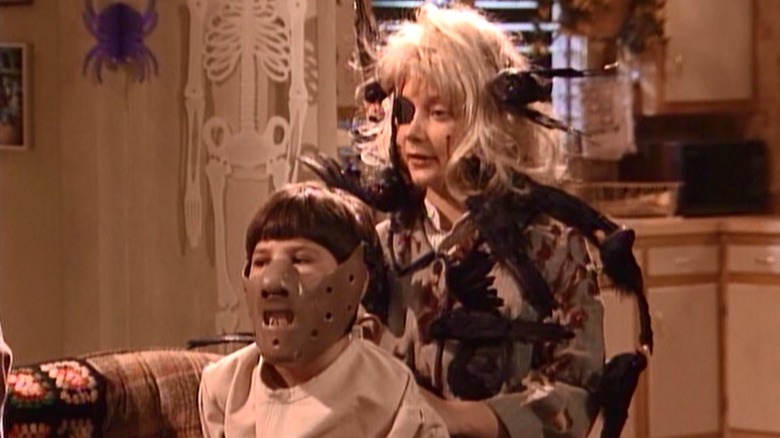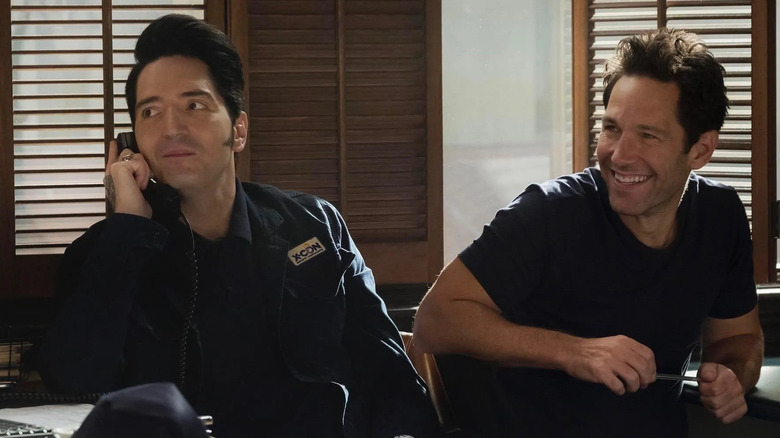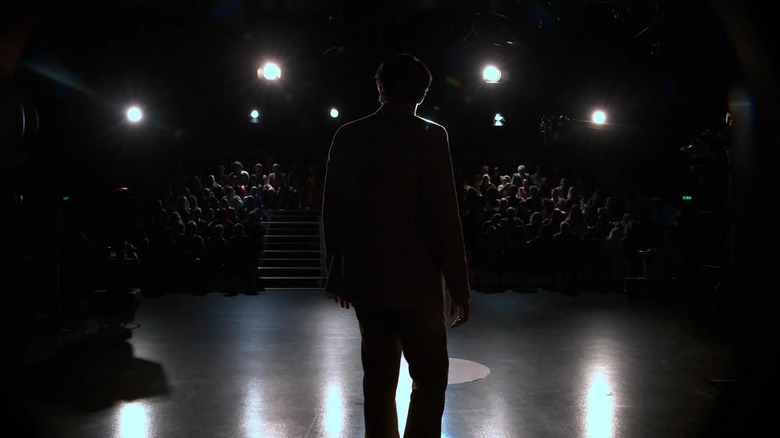David Dastmalchian Brings His Horror Host Bonafides To Late Night With The Devil [Exclusive Interview]
One of SXSW 2023's most interesting midnight films was an indie movie called "Late Night with the Devil," which is set in the 1970s and takes place almost entirely during the live taping of a late night talk show's big Halloween special. This special brings in hypnotists, fortune tellers, and a young girl who is believed to be (and most definitely is) possessed. The host of this talk show is Mr. Jack Delroy, an ambitious and complicated man who is really good at his job, but will never be as popular as the Johnny Carsons of his time.
Beloved character actor David Dastmalchian plays Jack Delroy. You know him as Polka Dot Man in James Gunn's "The Suicide Squad," and from his work in everything from "Dune" to "The Dark Knight," but now he gets the chance to take center stage, playing this late night talk show host who presides over an increasingly chaotic night of real horrors.
Dastmalchian sat down with me during SXSW to talk about his approach to this character, the unique way in which this movie was shot, and how his own history with late night horror hosting as the cult figure Count Crowley informed how he played this new character.
Note: This interview has been lightly edited for clarity and brevity.
'There's something about that taboo, secret club of people who stay up past a certain hour to watch television'
Your love of horror hosts is really interesting considering the character that you play here. Obviously, the late night talk show host is a different breed, a different kind of TV personality...
But there's a spiritual connectivity, don't you think?
Especially how you're playing your character here, since the show you're hosting is a Halloween special. Was there anything that carried over for you from your time as Count Crowley to Jack Delroy?
Oh, totally. I think there's a lot of connective tissue. In fact, Cameron [Cairnes], one of the co-writers and directors of the film, said the reason he first thought of me for Jack Delroy was he read an article that I wrote for Fangoria Magazine about horror hosts. And he was like, "This guy is an actor who I think is cool and also he has this love and passion for late night culture."
There's something about that taboo, secret club of people who stay up past a certain hour to watch television. If it's subversive comedy, if it's especially off the wall-style interview stuff, or horror hosting, there is something in that world that they all share. So I totally wanted to bring that to the forefront, as well as this idea of being that it's Halloween night. All the spooky, fun texture that comes with the Halloween specials of our childhood, when you think back to how rad it was during Halloween week on episodes of shows like Letterman or Carson and that stuff.
That even spills over to regular programming. I'll always remember the Halloween specials for shows like "Highway to Heaven" and "Roseanne."
The "Roseanne" Halloween episodes were so good, man. They were so good.
'I really love the Jekyll and Hyde nature of a character who, internally, is coming apart at the seams'
We should talk about the character of Jack, who is an extremely rich character. He's a showman, he's a bit desperate, and there's a lot of sadness beneath the surface. Was it clear to you just from the script when to modulate between those aspects of his personality? Or was that more something you found in the moment while you were shooting?
No, there was a beautifully written arc for this guy that I was attracted to when I first started reading the script, where you've got something that I personally can relate to, which is an individual who works in front of the camera, in front of the public, who is called upon because of the nature of his job to create, and dare I say even manufacturer, a public persona that reflects whatever it is that he needs to be reflected at that time.
That tension and pressure, especially when what's going on underneath the surface is not something necessarily positive, is a fascinating place to lurk as an actor. I really love the Jekyll and Hyde nature of a character who, internally, is coming apart at the seams. He's losing his mind quite literally in front of the world, while on the surface, he is quick-witted, jokes, charm, and affability.
So that was this fascinating terrain to walk, and I was so glad that the Cairnes Brothers were so encouraging of me taking it as far as we possibly could, especially into that nuanced space where we start to wonder what's real and what's illusion and what's science and what's spirit, and what's psychology and what's supernatural.
You get the idea that perhaps he sacrificed a lot to get here. What's interesting to me when you have a character that desperate is you can tell that his instinct is to be kind and nice and protective, but the second he starts hearing about the ratings going up, then all that goes out the window. Which is really fascinating, because I think that's extremely relatable.
We don't want to acknowledge how much we are both conditioned to and innately believe that our identities, our values as people, are reliant upon quantifiable data, including success, popularity. If you have a passion and a dream for something, there's a real fine line sometimes between being passionately ambitious and being dangerously self-serving. And it's not always this very clear-cut black and white space, and it can create a lot of ambiguity — can create a lot of, I think, internal conflict. A lot of shame.
For a man like Jack, who has put his career so much into first position that he possibly and most surely neglected the love of his life in her hour of need, [that] haunts him to the point where now what's going on in his reality is, well, for the audience to decide, but somewhere between complete disassociation and even potentially the manifestation of poltergeists.
Right. And how screwed up is it if he made that sacrifice and still didn't succeed at what he was doing?
That's the suckiest thing of all, isn't it? That's the Faustian kind of curse.
'It was a totally new playground and it was really exciting for me'
In order to replicate that '70s talk show feel, it's restrictive on the camera operators, but that restrictiveness seems like it would also free you up a little bit to where you're not having to worry about insane blocking every five minutes. Can you tell me a little bit about the benefits of shooting this film in that way for you as the leading actor?
Yeah. It was a totally new playground and it was really exciting for me, because I did get the indulgence of having a scene partner, which was the camera, in a new way. Because as a host of a late night talk show, a lot of the delivery is tossed directly to the home audience and to the camera. The directors insisted on having these three big pillar canon cameras moving around the set like they would have on a show like "The Tonight Show" or "Late Night with David Letterman."
So I'm just getting to move about the space and kind of choreograph myself, unless lighting got out of control, in a way that felt like I could listen to my own impulses and then just find the cameras at the certain moments when I would need to. The rest of the time felt very comfortable to just make choices and act and react to my scene partners without having to be conscious of blocking the way you normally would, single or two-shot filming, which is fun. I love that element of the craft of filmmaking and film performance, but this was totally different and it was so cool. It was so liberating.
When you say that they had those big cameras, did they actually film with those kinds of cameras or were those props around the real cameras?
Sometimes they actually had the cameras mounted inside of those cameras. Our cinematographer, he had actually worked in, and he was using camera operators who had worked in, old format television shooting, like multi-cam TV shooting. So it was awesome, because they had all the instincts and they knew all the tricks to make it really feel like that. So sometimes I'd be talking to a contemporary looking camera, even though I know it was supposed to be one of the prop cameras, but other times the prop cameras are moving around and doing their thing.
Then, of course, when we were working in between moments during the commercial breaks, we slipped into this kind of verité documentary style behind the scenes footage that was also a blast, because then they were generally handheld and just moving around us, and they wanted it to feel the way a documentary would feel, so it was never really intricately blocked unless we had a bunch of foot traffic. And when we did, it always flowed in this really high [tension], high energy way that reminded me of a Sidney Lumet movie or something.
You also have to keep in mind that if you're staying within the reality of that universe, one thing that I appreciate is that it wasn't such an "Office"-style documentary thing, because back then, how would they have been shooting behind the scenes footage? It would've been like 16mm on somebody's shoulder.
Yes. Exactly.
'That's a fun and dangerous approach'
What did you do as a performer to avoid the typical possession trope? I think one thing that's really interesting about the whole setup is that you're not going to be coming in here and be a sneaky man of faith or something that's going to be able to exorcize a demon.
I took the position that, do I really believe this girl's possessed by a demonic spirit? No. Do I believe that this girl survived a really horrible experience and that, psychologically, she's a fascinating case study and that if we can get this on live television in front of the world, not only are we going to help promote this important work that this woman, Dr. June Ross Mitchell, is doing, but this is going to make amazing television. So I really felt like coming at it from that point of view helped me not feel like some exploitative showman in the worst way, but it felt like I really believe in June, and I believe in the work she's doing, and I want the world to see and I believe what we're going to see based on the tapes that I've heard is something pretty awesomely terrifying, which is entertaining nonetheless, but it still is important work that she's doing for this poor girl.
I think that really helped me, because it doesn't feel like I'm trying to fix anything. There's no religious aspect to this. We've seen that so many times and it's been done so well. I'm trying to think of an example where somebody wanted to see the thing. Really, like, "Let's make this happen!"
That's a fun and dangerous approach, because we see it now in obviously a much more extreme way, but the exploitation of so many things, especially when it comes to the polarizing cable news culture of today, that is like, "We're going to splay stuff up here and get things pushed into the red zone both emotionally and psychologically, because guess what, maybe it's good for the political conversation." I'm sure that's what a lot of these a-holes are telling themselves. "It's good for the conversation, good for the dialogue." When really we know that underneath, these guys need the numbers and they want the eyeballs.
Well, that's my time. Thanks for taking the time to chat with me, and I hope we can talk more down the line since you have, like, 27 projects happening this year.
Thanks, man. We've got much more to talk about in the future. Thanks for talking about Crowley. I've got a very exciting surprise secret project: I'm collaborating with the very talented Boulet Brothers. I can tease that to you. There's something coming that I've been able to help perform with them on, and I can't wait for you to see that and then a whole lot more.
